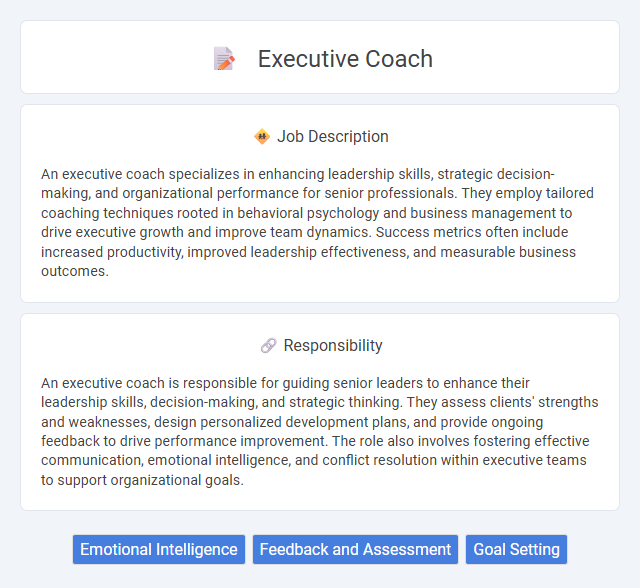
An executive coach specializes in enhancing leadership skills, strategic decision-making, and organizational performance for senior professionals. They employ tailored coaching techniques rooted in behavioral psychology and business management to drive executive growth and improve team dynamics. Success metrics often include increased productivity, improved leadership effectiveness, and measurable business outcomes.
Individuals with strong interpersonal skills and a genuine interest in personal and professional development are likely to thrive as executive coaches. Those comfortable with high-pressure environments and adept at motivating diverse personalities may find this role particularly suitable. Conversely, people who struggle with ambiguity or lack empathy might face challenges adapting to the nuanced demands of executive coaching.
Qualification
An executive coach must possess a deep understanding of leadership development, often supported by certifications such as the International Coach Federation (ICF) credential or a background in organizational psychology or business management. Key qualifications include strong communication skills, emotional intelligence, and proven experience in guiding senior leaders through complex challenges to enhance performance. Practical expertise in strategic planning, conflict resolution, and performance improvement is essential for effectively supporting executives' growth and organizational success.
Responsibility
An executive coach is responsible for guiding senior leaders to enhance their leadership skills, decision-making, and strategic thinking. They assess clients' strengths and weaknesses, design personalized development plans, and provide ongoing feedback to drive performance improvement. The role also involves fostering effective communication, emotional intelligence, and conflict resolution within executive teams to support organizational goals.
Benefit
Executive coaching probably enhances leadership skills, enabling individuals to make more effective decisions and drive organizational success. It likely improves communication and interpersonal abilities, fostering stronger team collaboration and employee engagement. The personalized feedback and goal-setting in executive coaching may lead to increased self-awareness and professional growth.
Challenge
The challenge of an executive coach job likely revolves around balancing the diverse needs of high-level clients while driving measurable leadership growth. Navigating complex interpersonal dynamics and adapting coaching methods to rapidly changing business environments probably demands advanced emotional intelligence and strategic thinking. Maintaining client engagement through sustained performance improvements could require continuous learning and flexibility in approach.
Career Advancement
An executive coach accelerates career advancement by enhancing leadership skills, improving strategic decision-making, and fostering emotional intelligence in senior professionals. Through personalized coaching sessions, executives gain clarity on career goals, overcome obstacles, and develop actionable plans for promotion and organizational impact. This targeted support drives measurable improvements in performance, increasing the likelihood of securing C-suite positions and higher-level responsibilities.
Key Terms
Emotional Intelligence
Executive coaching focuses on enhancing Emotional Intelligence (EI) to improve leadership skills, decision-making, and team dynamics. Coaches assess and develop competencies such as self-awareness, empathy, and emotional regulation to drive performance and organizational success. Mastery of EI enables executives to navigate complex interpersonal challenges and foster a positive workplace culture.
Feedback and Assessment
Executive coaches specialize in providing targeted feedback and comprehensive assessments to enhance leadership performance and decision-making skills. Utilizing tools like 360-degree feedback, personality assessments, and behavioral evaluations, they identify strengths and areas for improvement in executives. This data-driven approach enables personalized development plans that drive measurable growth and organizational impact.
Goal Setting
Executive coaches specialize in goal setting by helping leaders identify clear, measurable objectives aligned with organizational vision and personal values. They utilize evidence-based strategies such as SMART goals and continuous progress assessments to enhance accountability and motivation. By fostering self-awareness and strategic planning, executive coaches empower professionals to achieve sustainable leadership success and drive business growth.
 kuljobs.com
kuljobs.com